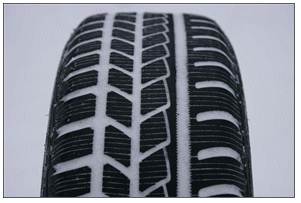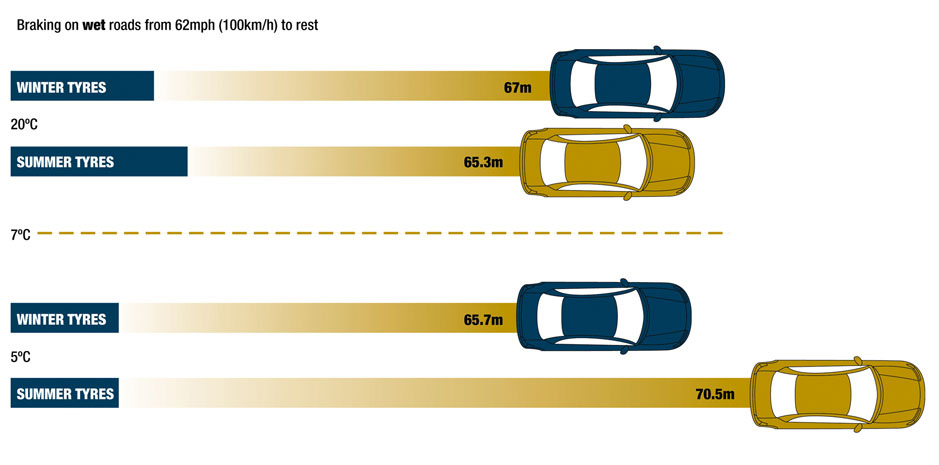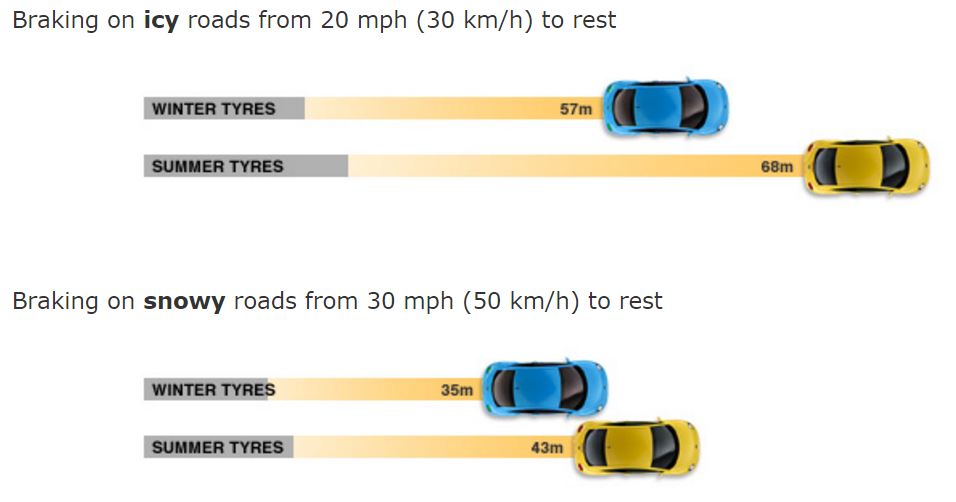Tyre Search
Winter Tyres from National
Winter tyres stock is supplied to the UK market by most tyre manufacturers in autumn each year – so National have supplies in stock from September onwards. We normally have a vast range of winter tyres available, just use the search tool above which has been pre-filtered to select winter tyres only
Winter Tyres / Cold Weather Tyres – what are they?
Winter tyres (also known as snow tyres or cold weather tyres) are specially designed to deal with colder, wet, icy and snowy conditions. They are not specific to snow and ice – so if you think you don't need them in the UK, think again! Drivers using winter tyres experience significant improvements in braking and grip, especially if their vehicle is rear wheel drive (where traction is always an issue in slippery conditions).
What is different about winter tyres or cold weather tyres?
- Winter tyres or cold weathe tyres are produced from a different mixture (compound) of materials than standard/summer tyres. Winter tyres have more natural rubber in them, and this is less affected by cold temperatures. It doesn't harden as much, and has better flexibility and grip in cold temperatures.
- The pattern (or 'tread') on winter tyres has more grooves than standard tyres. This means more snow sticks to the tyre, which actually helps improve grip in snow as snow sticks easily to snow. This helps the tyre acheive better grip.
- Winter tyres also have a higher number of 'sipes' (little channels or slots) creating many biting edges that lock into icy and snowy roads, thus helping your vehicle brake and accelerate.

Avon Ice Touring ST tyre
Winter tyres - the benefits
There's no doubt that winter tyres are safer than standard tyres in cold weather.
- Braking distance improves on wet roads
- Braking distance improves on icy roads
- Braking distance improves on snowy roads
They give improved traction in all winter weathers that drivers normally dread – cold, rainy, slush, ice and snow.
The chart below shows the difference in braking distance between summer and winter tyres when travelling on a wet road at just over 60mph and at different ambient temperatures;

At 20 degrees Celcius, the summer tyre performs marginally better in wet braking. BUT in temperatures of 7 degrees Celcius and below, the winter tyres really come into their own.
Switch conditions to icy roads ans snowy roads ans the differences are even more clear to see;

When should I use winter tyres in the UK?
Winter tyres or cold weather tyres are of great benefit once the temperature falls below 7 degrees C, which is generally between October and March in the UK.
How about using them in summer?
You can also use winter tyres in summer time with no issues. For many drivers, if they could only choose one set of tyres for use throughout the year in the UK, winter ones would be the preferred choice.
Do I only need to replace two tyres?
To get the best results from your tyres, you should fit a set of 4 to your vehicle. A combination of winter and summer tyres could result in unpredictable handling.
What difference do winter tyres make to the comfort of my drive?
You will notice little or no difference to the comfort of your drive – today's winter tyres give just as comfortable a ride as standard tyres, and are equally quiet.
Why is the speed rating not the same as my usual tyres?
Summer tyres have higher speed ratings than winter tyres, but rest assured this won't have an impact on your driving as even an H rate winter tyre can achieve speeds over 130mph.
Does it make any difference if my car has traction control?
Traction control limits your vehicle's acceleration to the traction levels your tyres can achieve – but it doesn't physically improve the tyre's traction.
Do I need winter tyres if my vehicle has ABS?
ABS (anti lock braking) restricts your vehicle's braking to the traction the tyres can achieve, but it does not physically improve the grip of your tyres, unlike winter tyres.
Is it true that front wheel drive cars drive better in snowy conditions?
This is true as a FW drive vehicle has most of its weight (about 60%) resting on its front wheels. While this is helpful when accelerating it does not much improve braking. The distribution of weight in a FW drive vehicle is also not ideal for handling and corners. However, winter tyres can noticeably improve performance.
Tyres' Air Pressure in Winter
Your vehicle is held up not by its tyres, but by the air in them, so maintaining the right level of air pressure is crucial for your car's braking and handling. The air pressure in your tyres must be monitored and maintained – it changes in different weather conditions and due to naturally escaping air, and should be adjusted to suit your vehicle's load.
As air contracts in cooler winter conditions, you must make sure to monitor your tyres' pressure a minimum of once a month. The pressure in your tyre will fall by c. 1 psi for every 10 degrees F that the air temperature falls by.
Make sure you check the tyre pressure when the tyres are cold – i.e. when they are the same as the outdoor air temperature. If your vehicle is parked in an indoor garage, the tyres 'lose' air pressure as you leave it for colder outdoor temperatures.
You should also double check your tyres all have valve caps, and replace them with new ones if not. Moisture from the air can freeze in the valve, expanding it and thus letting air escape.
Winter Tyres and Car Insurance
In recent years some insurance bodies have actually put up premiums on vehicles with winter tyres as they classed them as a modification – despite the fact they actually improve safety. However, much work has been done to improve this misunderstanding by insurance companies. The majority of insurers do not now need to be told that you've fitted winter tyres as long as they are 'correct for the vehicle and professionally fitted.' Best practice is to double check with your own insurance company beforehand. All tyres purchased from National Tyres and Autocare will be professionally fitted by our technicians.
Winter Tyres Around the World
In many European countries, it is standard for drivers to own both a summer and a winter set of tyres, and to switch between the two in autumn and spring.
Until now in the UK, most cars come fitted with standard/summer tyres. However, following the severe winters that the country has suffered from over the last two years, drivers are now beginning to see the advantages of winter tyres and to create more of a demand for them. Hundreds of thousands of drivers in Europe are very aware of the benefits of winter tyres, and that number is set to grow as the UK adds to demand.
Are Winter tyres more expensive?
Although you have to spend more money when you buy a set of winter tyres, while these ones are fitted on your vehicle, your standard tyres will not be wearing down (as they will be sitting in your garage). As you will have 2 sets of tyres in circulation, each set will last for a longer time. Also, your investment in winter weather tyres don't have to break the bank. There are several cheap winter tyres available for most makes and models.
What do I do with my standard tyres when I've to winter ones on?
National Tyres will give you back your standard tyres for you to keep in a dry, cool garage or shed. They should be kept out of direct sunlight, so shield with an old rug or sheet if they close to a window.
Stock Levels
In some years winter tyre stocks have not met demand, especially when unpredicted severe weather hit the UK. National's stock arrives around September each year, so we'd advise you to place your order early to avoid disappointment.
Winter Tyres/Other Countries
If you are driving abroad, make sure you check what laws apply regarding winter tyres. Some countries stipulate by law that you must use winter tyres so make sure you check with your insurance company or the AA.
Cold Weather Driving Advice
Make sure you drive safe this winter by checking these simple tips:
- Buy a set of four winter tyres if you can.
- Ensure your tyre tread (whether summer or winter tyres) is as good as possible, i.e. deep. This is crucial to your car's traction and braking performance.
- Make sure you can see clearly. Clean off ALL snow and ice from your car windscreen and all windows before driving.
- Ensure your car lights are all functioning properly, and clean off any dirt/snow.
- Remove any snow from the car's roof before driving so it does not slip down and obscure your windscreen. Snow on your roof can also be a hazard to other drivers.
- Drive more slowly! Wet and slippery roads take longer to stop on, so keep your speed in check.
- Maintain a reasonable distance between you and the car ahead on the road.
- Prepare for the worst – pack your car with a warm coat and clothes, deicer, an ice scraper and a warning triangle.
- You should NOT drive in severe weather unless it's an absolute emergency. If so, ensure you have warm blankets/clothes, a hot beverage and food with you. Also pack a spade just in case you need it.
- Drive with care, using gentle manoeuvres. Don't accelerate or brake sharply. Use the highest gear you can as this aids grip and helps avoid wheel spin. To drop your speed, slow down gently using the gears, don't brake suddenly. If your vehicle gets stuck on ice, put an old rug or sheet of cardboard under the wheels to help them grip. Once you get a grip, don't stop moving until you are clear of the icy patch.
For More Advice on Winter Tyres visit TyreSafe
TyreSafe, one of the UK's leading tyre safety organisations, has many informative articles and films on the benefits of winter tyres. Visit www.tyresafe.org to see the benefits for yourself.
Two exact BMW's go head to head with Summer and Winter Tyre tests. Judge for yourself which you think is more appropriate for the weather. Did this change your thinking about winter tyres?


 Sign up for SPECIAL OFFERS
Sign up for SPECIAL OFFERS
